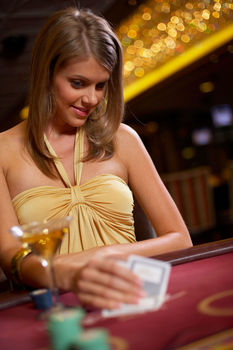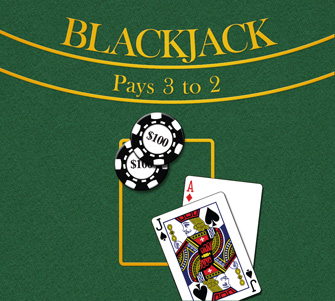Bad Ideas in Blackjack Play
Blackjack Strategy to Avoid
Most bad ideas in blackjack play revolve around basic blackjack strategy. Most of what you do is determined by the face card the dealer is showing, and how that corresponds to the two cards you are dealt. You can eliminate most bad blackjack decisions by learning basic blackjack strategy charts, but there are a few bad blackjack ideas that happen irrespective of the cards being held. Below is a list of some of the most common bad ideas in blackjack play and blackjack strategy to avoid.
Do Not Copy the Blackjack Dealer's Moves
Being a copycat is the first of blackjack don'ts. Just because he's a dealer, do not assume he's a master at blackjack. The dealer's moves are dictated by casino rules. He stands on 17 or higher and he hits on 16 or lower. So the dealer's moves could be performed by a monkey (well, maybe not, since the monkey can't count to 21, but you get my point).
Also, don't take out your frustrations on the dealer. He or she is a casino employee, not your personal opponent. Whatever the dealer wins doesn't go into his or pocket. Tip the dealer whether you win or lose. If you are rude to the dealer, you'll find these people can make your gambling life more difficult, though. Just remember to be polite to the staff.
Blackjack Seat Position
Cards are dealt in the semi-circle from the dealer's left to his right in a clockwise rotation. Therefore, the first cards will be dealt to the 1st seat to the dealer's left, then the 2nd seat. Hand resolution occurs in the same way. Avoid sitting in the 1st or 2nd seats. Sit at the 3rd (usually the middle of the playing table) or later. This way, you'll be able to see all the cards dealt better, and you'll have a little more card counting information (and time to compute) when making your bets.
Don't Take Blackjack Insurance
Generally speaking, blackjack "insurance" offers worse odds than playing out the hand. Insurance is allowed when the dealer is showing an Ace. Players can take insurance, where they place a separate bet that the dealer will hit a blackjack 21. This bet can be half the original wager, meaning the player will win back half of the money lost, if the dealer hits blackjack.
If you're a non-card counter, always avoid insurance. That's because the odds of hitting a "10" to complete the blackjack is 4 out of 13, so the odds are against the dealer hitting his blackjack. In fact, you have better odds if you just play out the hand. If you're a card counter and you know the odds are greater than 4:13 that the dealer will hit the blackjack, then there are instances where it's in your best interest to make the insurance bet.
Surrender Is Only Sometimes a Bad Idea
 A lot of blackjack players believe that surrender is always a bad idea. Players will reflexively refuse to surrender, even when that option will save them money. This might be from macho gambling attitude, where surrender seems cowardly. Or it might be from the mistaken notion that "blackjack surrender" is a sucker bet or tourist trap laid by the casino. In fact, surrender sometimes is to the advantage of the blackjack players. It's not always a bad idea in blackjack.
A lot of blackjack players believe that surrender is always a bad idea. Players will reflexively refuse to surrender, even when that option will save them money. This might be from macho gambling attitude, where surrender seems cowardly. Or it might be from the mistaken notion that "blackjack surrender" is a sucker bet or tourist trap laid by the casino. In fact, surrender sometimes is to the advantage of the blackjack players. It's not always a bad idea in blackjack.
Let me define surrender, for the new blackjack player. Surrender is a way to lose half the bet in order to lose all of your bet. Casinos don't allow surrender in every situation, and not all casinos offer surrendering. Most of the time, it happens when a playing is holding a "15" or "16" and the dealer is showing a "9", "10" or Ace. (Not all of these instances pay to surrender.) Many players surrender when they have 8-8, though this gives the house a slight advantage.
Typically, a player should surrender when the dealer is showing a "10" and the player is holding a 10-5, 9-6, 10-6 or 9-7. The player should surrender when the dealer is holding a "9" and the player is holding a "10-6" or "9-7". Also, the player should surrender when the dealer is holding an Ace and the player is holding a 10-6 or 9-7. There are exceptions to these rules, depending on the specific rules of the casino, especially when dealing with soft 17's.
This is why a casino offers surrender. The strategy is complicated enough that it pays off for the casino to give a little money back to the knowledgeable blackjack players, because they'll win a lot of extra money off players who either surrender when they shouldn't or refuse to surrender when they should.
Avoid Card Counting When You Aren't Good At It
If you haven't mastered card counting, it's a bad idea to walk into a casino and start trying to count cards. This is likely to confuse you, and you might not end up using the correct blackjack strategies when hitting or standing. More likely, you'll make bad blackjack plays, while also betting much more during the wrong parts of the game. If you aren't good at card counting, then counting cards will cause you to lose more money than if you simply played basic strategy blackjack.
Forget Basic Strategy
You should brush up on basic strategy every so often. Blackjacktactics.com suggests studying basic blackjack strategy once per year, even if you've been playing for 20. Also, read two new blackjack books per year. This way, you'll refresh your blackjack memory.
We're processing new information all the time. As new information enters the brain, we tend to forget old information. Or we get bad blackjack habits because we think we know all the answers. So give yourself a blackjack primer occasionally to reinforce what you already know, and relearn what you've already forgot about blackjack. Blackjack can be complicated, so it's easy to assume we know everything and continue to follow bad ideas in playing blackjack.
See also:


 CasinoMax
CasinoMax


